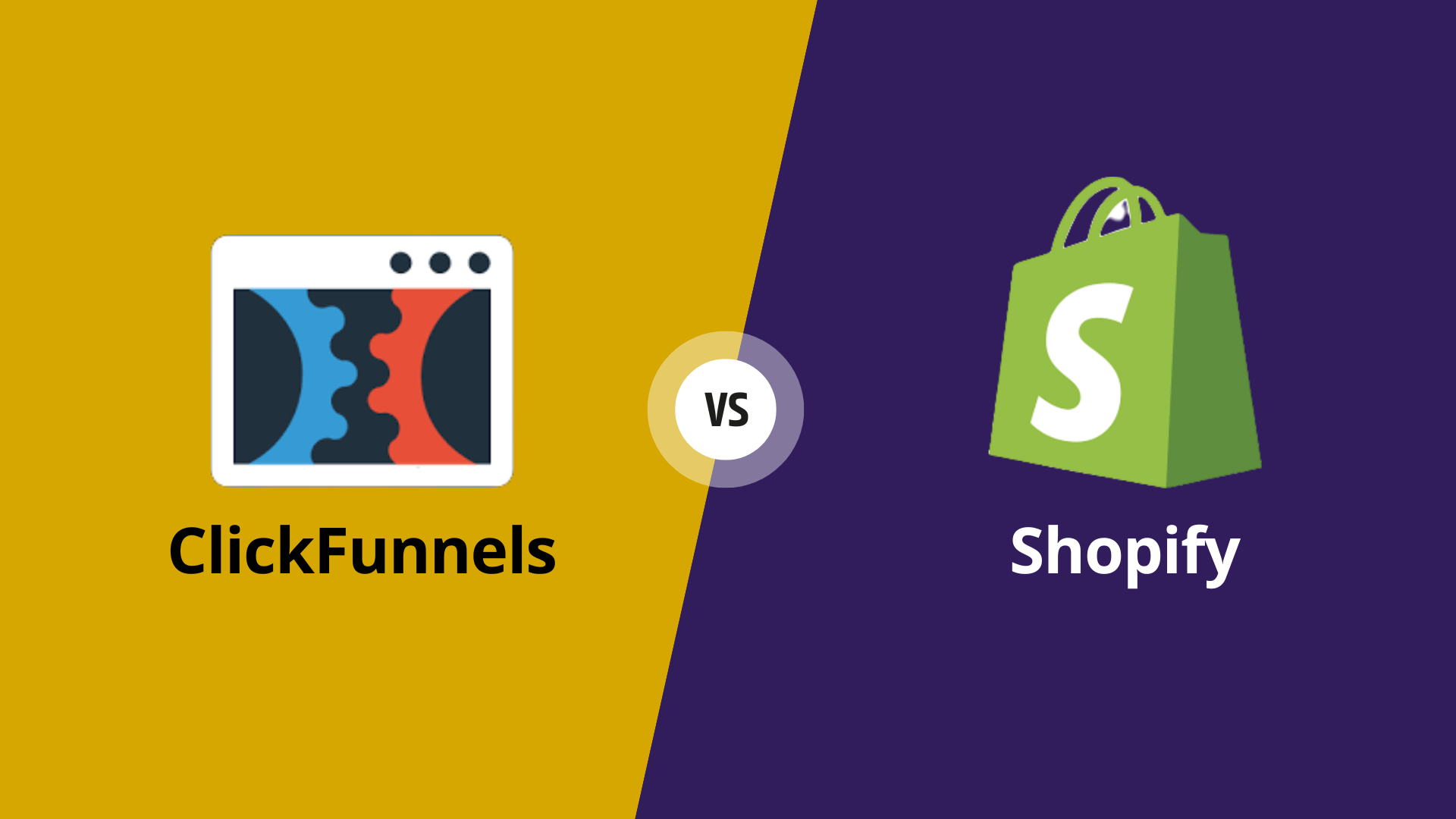If you’ve been on the hunt for ways to kickstart your online store, chances are you’ve stumbled upon two big players: Shopify and ClickFunnels.
Both offer unique strengths, but with a lot of dropshipping and e-commerce guides out there, it’s easy to feel overwhelmed. So, which one is the best fit for your business?
Let’s take a deep dive into comparing ClickFunnels vs Shopify to figure out which one is the perfect fit for your business!
Table of Contents
Overview of Clickfunnel and Shopify
Shopify and Clickfunnels stand out as leading platforms in online business, but they serve different purposes.
Need a quick rundown? Let’s take a peek at ClickFunnels vs Shopify before we dive into comparing them.
What is Shopify? How it works?
Shopify is a popular all-in-one e-commerce platform trusted by millions of businesses globally. It’s like a one-stop shop for everything you need to sell online, with tons of integrations and customization options.
Shopify simplifies the whole selling process, from taking orders to analyzing sales trends, all through one dashboard. With Shopify, you can set up your store and sell across different channels like your website, social media, or even in-person at physical stores.
Once a customer makes a purchase, Shopify enables you to effectively handle the order fulfillment process. Crucially, sellers can oversee inventory and monitor all orders through a dashboard that showcases reports, analytics, and other useful details.
Overall, Shopify is a go-to choice for both newbies and seasoned pros in the field of online selling.
What is Clickfunnel? How it works?
ClickFunnels is an all-in-one tool for building sales funnels, designed to help sellers establish online stores without requiring technical know-how.
ClickFunnels gives you all the tools to create effective sales funnels that can promote, sell, and deliver your products online. Besides, it’s also equipped with marketing tools and analytics to keep track of how sales funnels are performing.
The cool thing about ClickFunnels is that it guides potential customers through a journey from initially showing interest to making a purchase. It’s not just about processing payments, it monitors every step of the funnel to make sure you’re getting the most out of your sales efforts.
In a nutshell, ClickFunnels is great for businesses looking to boost sales through targeted marketing and smart funnel strategies.
Clickfunnels vs Shopify: Feature Comparision
ClickFunnels and Shopify are used for different kinds of online stores. When you look at them side by side, you’ll see they have unique features and ways people interact with them. Here are some key differences between ClickFunnels and Shopify:
Ease of Use
Shopify is like your tech-savvy best friend thanks to its user-friendliness with tons of website themes.
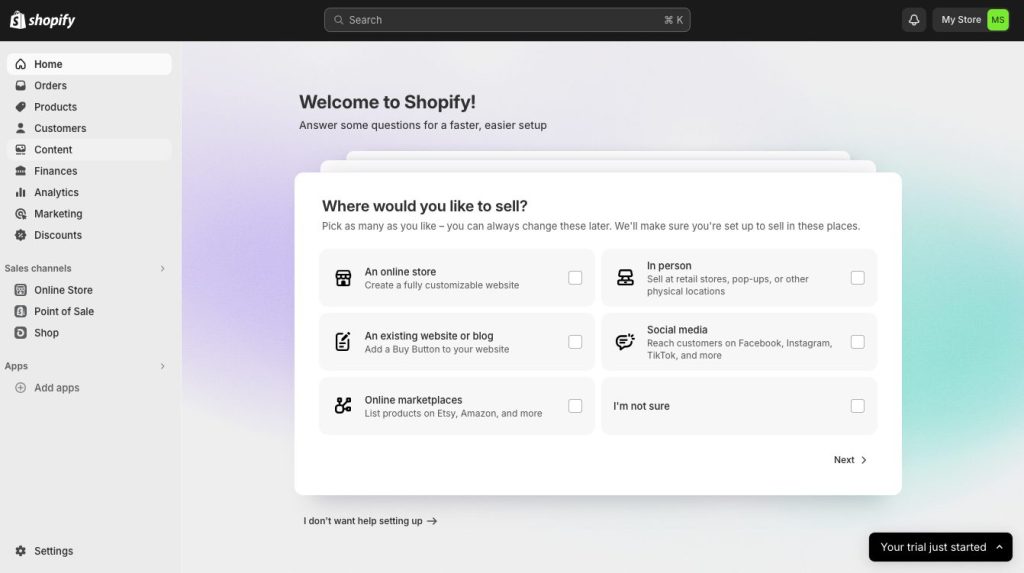
On the contrary, ClickFunnels is not as intuitive for beginners as Shopify. It mainly focuses on creating high-converting sales funnels and offers many tools to boost conversion rates.
If you’re new to this online biz world, Shopify’s your go-to pal but Shopify, while ClickFunnels is more advanced and requires some technical expertise.
Online Store Builder
As its core, ClickFunnels shines in creating sales funnels with its various templates for different sales stages. It does offer customization options, but it’s not as robust in eCommerce features compared to Shopify.
Shopify, on the other hand, is built for full online stores. It provides a wide range of free and paid themes that are fast, responsive, and easy to customize, allowing you to create a professional-looking storefront without any coding. These themes give you the flexibility to design a layout that matches your brand and makes shopping easier for your customers.
So, if you’re aiming for a full-fledged online store, Shopify is your go-to. But remember, pick the one that best fits your business needs and goals.
Third-party Apps and Plugins
Shopify prides itself on its vast app store, packed with fantastic apps to increase sales and enhance functionality. This includes well-known apps such as UpPromote, Oberlo, Klaviyo, Yotpo, Boostify Sections, and Boostify Size Charts.
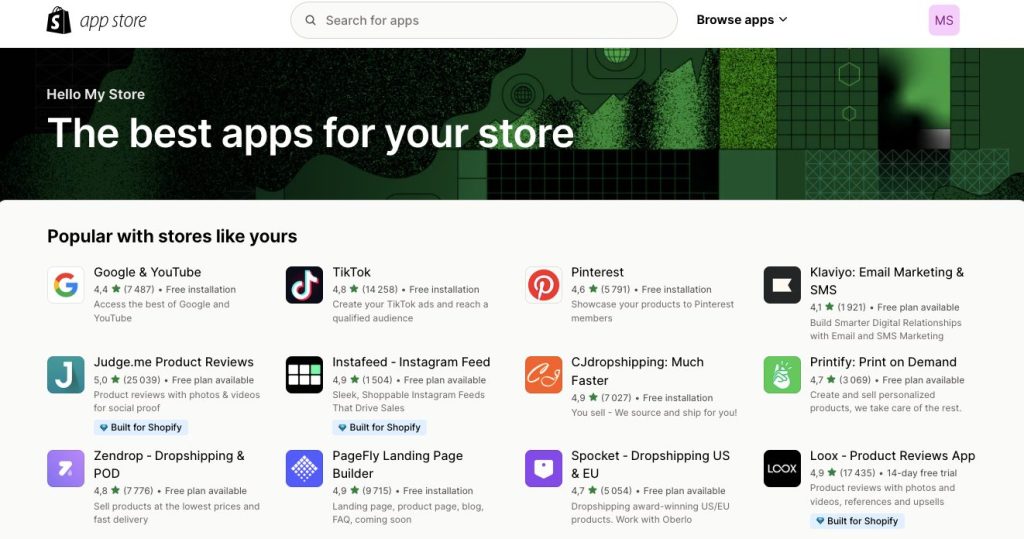
Conversely, although ClickFunnels lacks its own app store, it does provide integrations with a variety of third-party apps and plugins like Freshsales, Mindbody, Zapier, and others.
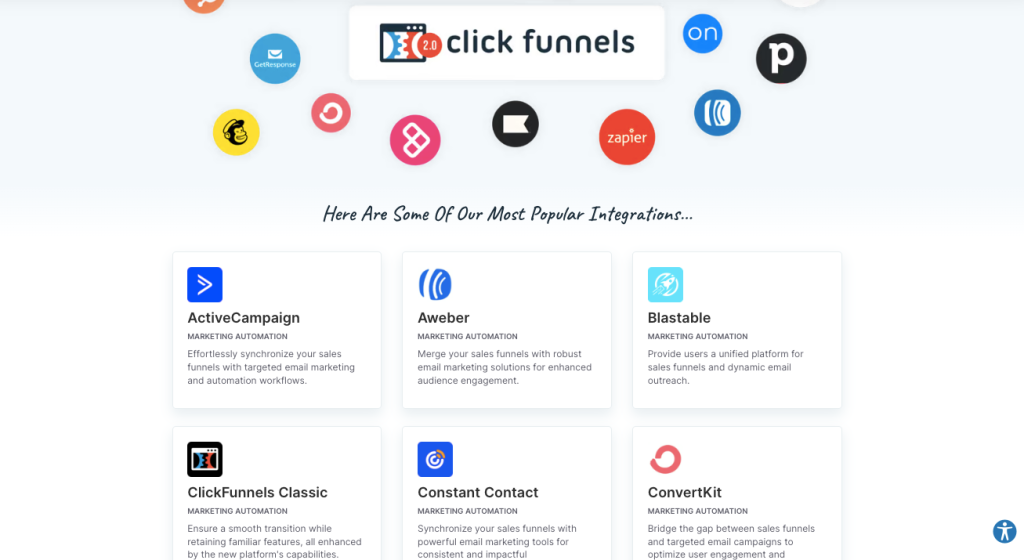
Inventory Management System
While ClickFunnels has some basic inventory management features, like keeping track of product quantities, like Shopify. On the other hand, proves to be the king in this area. It provides a strong inventory management system that makes it easy for businesses to stay on top of their current and incoming stock.
Product Management
With Shopify, you get a bunch of tools to manage your products like keeping tabs on inventory, handling different variations, and organizing collections. Meanwhile, ClickFunnels is more about fine-tuning your sales funnels and drumming up leads.
How to Create and Manage Multiple Shopify Stores
Payment Integrations
Shopify comes with its own built-in payment processing system, whereas ClickFunnels relies on third-party integrations.
ClickFunnels seamlessly integrates with popular payment processors like Paypal, Stripe, and others. However, note that ClickFunnels only supports one payment method at a time.
Now, with Shopify, get ready to be impressed! Shopify connects with over 100 payment providers globally, allowing your store to accept payments in various ways.
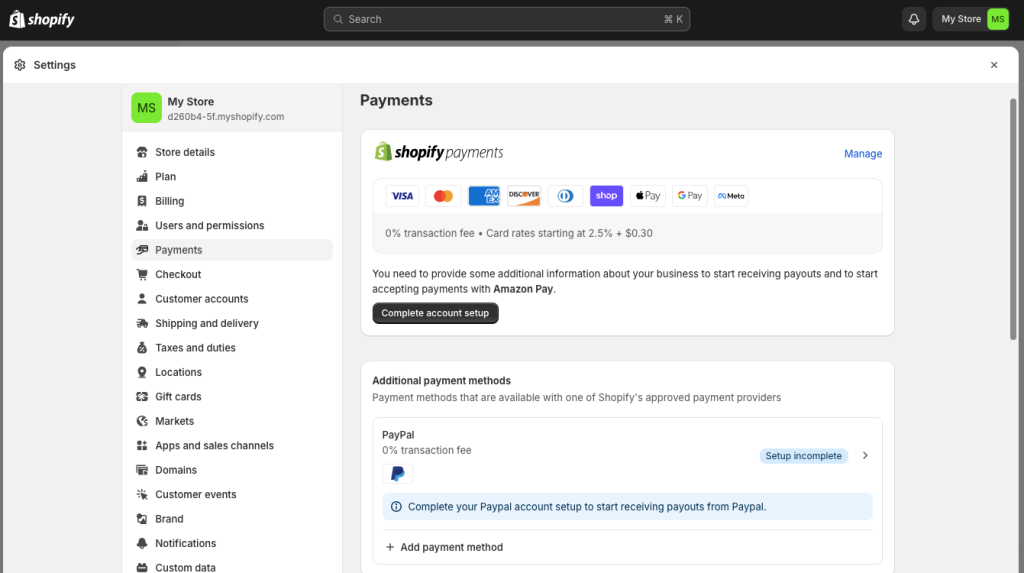
Shipping and Fulfillment
Shopify makes shipping and order fulfillment a breeze by offering features like live shipping rates and teaming up with top carriers like FedEx, USPS, UPS, and DHL.
In contrast, ClickFunnels allows users to integrate with third-party logistics providers like Shippo, and EasyPost to manage shipping logistics. These 3PLs allow you to partner with major shipping companies such as UPS, USPS, FedEx, DHL, and more.
Customer Management System
With ClickFunnels, you’ve got this awesome CRM system that gives you a ton of insight into your customers. You can see where they’re from, their email and social profiles, and what they’ve bought. Plus, you can group them for email campaigns tailored to their buying habits.
In comparison, Shopify keeps track of your customers’ shopping behaviors post-purchase. You can set up subscription pages to encourage repeat buys and send personalized emails based on their purchase history, spending, and location.
Social Media Integrations
Both ClickFunnels and Shopify have you covered here. They offer you unlimited integrations in this aspect. This means you can easily promote deals and promotions on social media platforms like Facebook, Instagram, and Pinterest. This enables customers to browse and purchase products directly within these platforms and apps without having to jump around.
Marketing and SEO System
ClickFunnels excels in targeted marketing and lead generation, making it a breeze for online sellers to create and launch sales funnels quickly. Not to mention, it also offers an affiliate marketing system to help sellers set up their affiliate programs to boost sales through a network effect.
Meanwhile, Shopify shines with robust SEO features and effective marketing tools, including email marketing and affiliate marketing. You’ll often find Shopify stores ranking well for some hard keywords, thanks to its advanced SEO features that can drive more traffic to your Shopify store.
Analytics Dashboard
ClickFunnels 2.0 features a built-in analytics dashboard that provides essential metrics in real time, offering detailed insights into customer behavior and website performance in the sale funnels.
In comparison, Shopify includes a comprehensive analytics dashboard providing all the key metrics such as orders, sales, and revenue for your e-commerce store. Different Shopify subscription plans offer varying analytical and reporting options.
User Technical Support
ClickFunnels and Shopify provide 24/7 customer support and effectively handle technical issues, minimizing disruptions for businesses.
ClickFunnels supports users via live chat and email support. It has a knowledge base and community forum for problem-solving, with reliable uptime for smooth operations. Shopify supports via live chat, email, and phone, maintaining high uptime rates with regular updates for a seamless user experience.
Pricing
Both platforms offer different pricing plans tailored to various business needs and sizes.
Shopify has 3 basic plans priced at $29, $79, and $299 per month, all with a 14-day free trial. Generally affordable, right? All plans come with a 14-day free trial.
In addition, there’s an enterprise-level option called Shopify Plus, starting at $2,000 monthly. Keep in mind, that Shopify also charges a transaction fee for credit card usage, which varies depending on the plan.
ClickFunnels also provides 3 pricing tiers, and typically higher than Shopify. They are:
- Basic: $147/month
- Pro: $197/month
- Funnel Hacker: $297/month
ClickFunnels also offers a 14-day free trial to get started.
Which one should we use: Shopify or Clickfunnel?
| Shopify | Clickfunnels |
|---|---|
| Pros: – User-friendly interface – Versatile apps and plugins ecosystem – Built-in payment gateway – Reliable customer support – Scalable platform | Pros: – Intuitive drag-and-drop funnel builder – Highly converting funnel templates – Customizable 1-click upsells, downsells, and order bumps – Advanced A/B testing toolExtensive educational resources |
| Cons: – Additional transaction costs – Reliant on apps – Limit on customization | Cons: – Highly-pricedThe initial learning curve can be daunting – No native blogging functionality |
Shopify: Pros and Cons
Pros
- User-friendly interface and great templates: Shopify is known for its easy-to-use interface and offers 12 free themes and 173 paid themes, making it simple for anyone to manage their online store without technical know-how.
- Wide range of apps and plugins: With an extensive app store offering over 8,000 different apps and plugins, Shopify allows users to enhance their online stores with additional features and functionalities.
- Built-in payment gateway: Shopify offers its own payment solution, Shopify Payments, integrated directly into the platform to make all transactions easier. Additionally, it supports various third-party payment gateways.
- Excellent customer support: Shopify has top-notch customer service, including a detailed help center and active community forum.
- Scalable platform: Shopify offers plans suitable for businesses of all sizes, starting from $5 per month and scaling up to Enterprise-level plans, making it ideal for businesses looking to scale.
Cons
- Extra charges for transactions: Shopify imposes additional fees on shop owners who opt out of using Shopify Payments.
- Reliant on apps: Despite Shopify’s relatively affordable plans, users must pay for extra apps and integrations to enhance their store’s features.
- Customization limitations: While Shopify allows for customization, users may face limitations on how much they can modify their platform, especially if they are unfamiliar with the liquid templating language on the platform.
Clickfunnel: Pros and Cons
Pros
- Quick and easy funnel building: ClickFunnels offers an easy drag-and-drop editor, making it simple to create funnels, even if you’re not tech-savvy.
- High-converting templates: ClickFunnels provides a range of ready-made funnel templates designed by experts, catering to various online marketers and sellers.
- Upsells and downsells: ClickFunnels allows one-click upsells and downsells within funnels, boosting the average order value and maximizing revenue.
- A/B testing: You can test different versions of your funnels to see which works best, whether it’s a landing page, single page, or email campaign.
- Education and community: ClickFunnels has a strong community and offers extensive resources like courses and webinars to help users get the most out of the platform.
Cons
- Expensive: ClickFunnels’ starting price is $147 per month, much higher than Shopify’s $39 per month. Not to mention, the basic plan of ClickFunnels doesn’t include some features and has limitations on domains, users, and payment gateways.
- Steep learning curve: While ClickFunnels offers many features with education resources, its interface can be overwhelming for newcomers, requiring time to grasp.
- No built-in blogging tool: ClickFunnels doesn’t have its own blogging tool, which might be a drawback if you want to combine content marketing with your sales funnel.
In Conclusion,
In the competition between ClickFunnels and Shopify, each brings its flavor to the e-commerce area. ClickFunnels specializes in direct sales funnel strategies, whereas Shopify is geared towards establishing extensive e-commerce stores.
Wait! Before picking sides, think about what you really need for your business! If you prioritize sales conversion, ClickFunnels is your go-to wingman. But if you dream of building a comprehensive online retail footprint, Shopify’s got your back.
With the right choice, you can establish a robust online identity, carve your niche, boost sales, and excel in the fiercely competitive e-commerce world like a true champ.
Read more:

